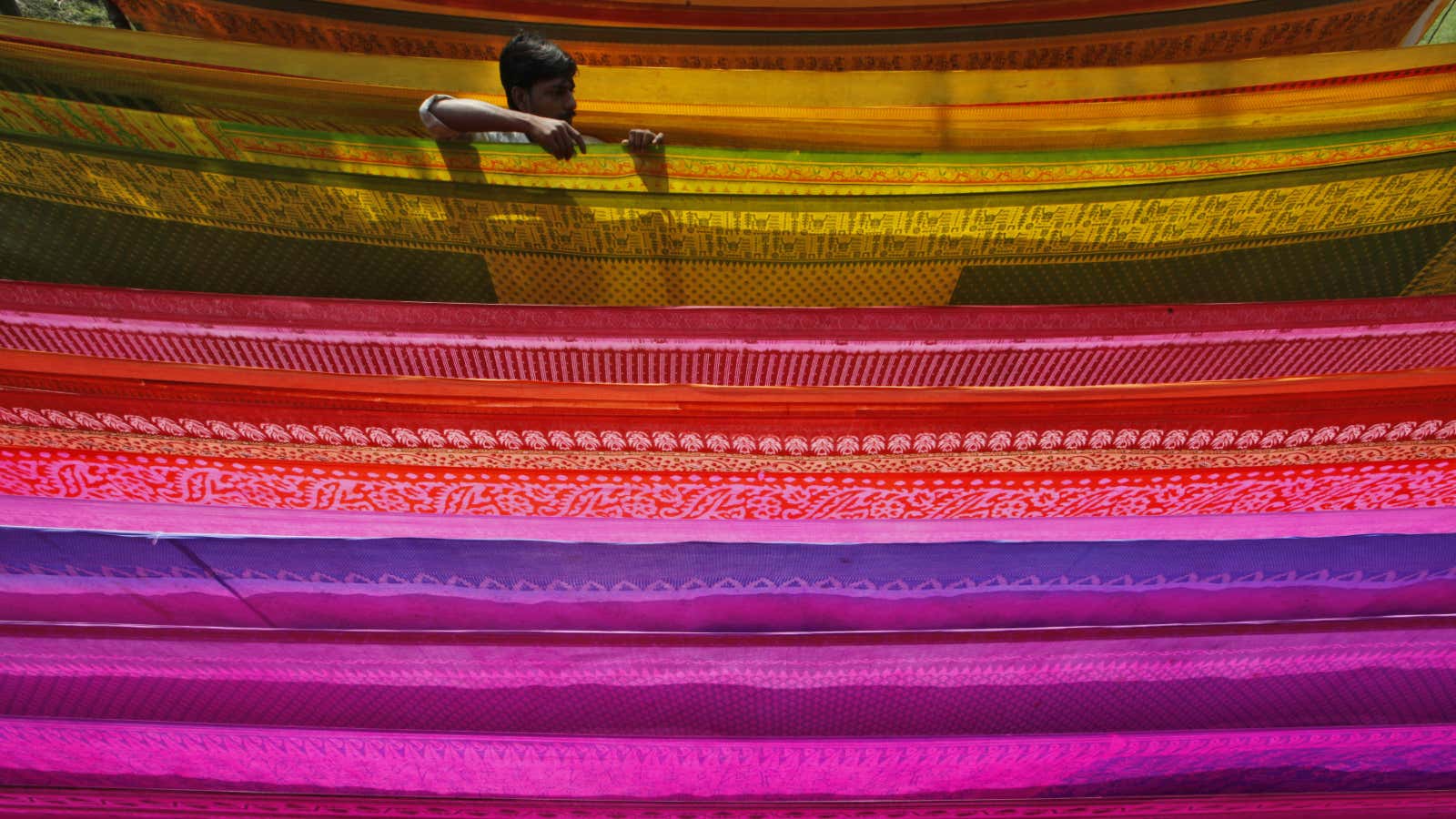India’s biggest watchmaker is going the whole nine yards to scale up its nascent sari business.
Titan Company, best known for its eponymous watches that challenged the monopoly of HMT in the mid-1980s, launched the sari brand Taneira in February 2017. The plan was to look beyond Titan’s existing watch, jewellery, and eyewear products, which it sells through 1,600 stores across India.
Launched on a pilot basis in the southern tech hub of Bengaluru, the Taneira stores sell ethnic wear, mostly saris priced anywhere between Rs1,500 and Rs2 lakhs. Encouraged by the success, the company now wants more of the lucrative segment, said Ajoy Chawla, who heads strategy and business incubation at Titan Company.
Over the next five years, the company plans to open over 40 stores across the country to sell ethnic wear. As a step in this direction, Titan launched its third Taneira store in the country in Delhi on Dec. 09. Saris, estimated to be a Rs40,000 crore (as of 2016) category in India, is a business the company can scale, said Chawla at the launch of the store.
Titan’s push into newer categories comes as the company pursues a revenue target of Rs50,000 crore for 2023, up from the Rs15,656 crore clocked in the financial year 2018. For this, it will have to grow beyond its mainstay gold jewellery (sold under the Tanishq and Mia brands) and watches.
Beyond keeping time
Titan first thought of diversifying into ethnic wear in 2016. In October that year, the company—a joint venture between the Tata Group and the Tamil Nadu Industrial Development Corporation (TIDCO)—said it was exploring “opportunities in personal lifestyle categories. One such category is special occasion ethnic wear for women,” the company had said in a filing to BSE then.
It soon set up an in-house team to test the waters, which culminated in the Taneira store in Bengaluru.
The move was prompted by the headwinds the company’s watch and jewellery businesses—the two accounted for over 90% of Titan’s FY18 revenues—had been facing. Whereas urban consumers were gravitating towards smartwatches, regulatory hurdles were creating bottlenecks in the sale of gold.
“In 2015, we were coming out of significant headwinds on the regulatory side. Jewellery and watches were going through a tough time. We even launched fragrances and wanted to scale that,” Chawla recalls. To focus on new segments, the company even made acquisitions—in 2016, it lapped up a majority stake in Caratlane, anticipating gains from online jewellery sales.
Turning the corner
Since then, things have been looking up for the company. For the quarter ended September 2018, Titan posted a 26% jump in income at Rs4,353 crore. Net profit in the period leaped 67% to Rs278 crore, driven by a strong festive season demand (pdf), coupled with higher marketing spends.
This, Chawla says, has given confidence for the company to grow Taneira. “Our core businesses are growing which means we have the opportunity to dedicate resources for exploring (new categories). The hope is that in five years these new categories (including saris) can contribute to 10% of Titan’s customers.”
This seems a reasonable bet as saris command a huge retail market in small towns and top cities.
“Titan and Tanishq as brands go with the Indian sentiment,” said Shubham Anand, head of retail-consumer packaged goods (CPG) at RedSeer. “Moreover, the ethnic wear market for women makes sense because that market is largely unorganised barring a very few national chains.”
There is little competition in the organised space, just a handful of players. New-Delhi based FabIndia sells a range of handwoven saris, while Chennai-based Nalli Silks has been expanding even overseas. “The category is unorganised and underserved from a point of view of providing authentic products and variety,” Chawla adds.
This is why executives at Taneira spent over a year getting its back-end ready. They have worked with over 400 weavers, besides sari suppliers, across the country. Titan, it seems, is doggedly pursuing its goal of becoming a multi-product lifestyle player.
